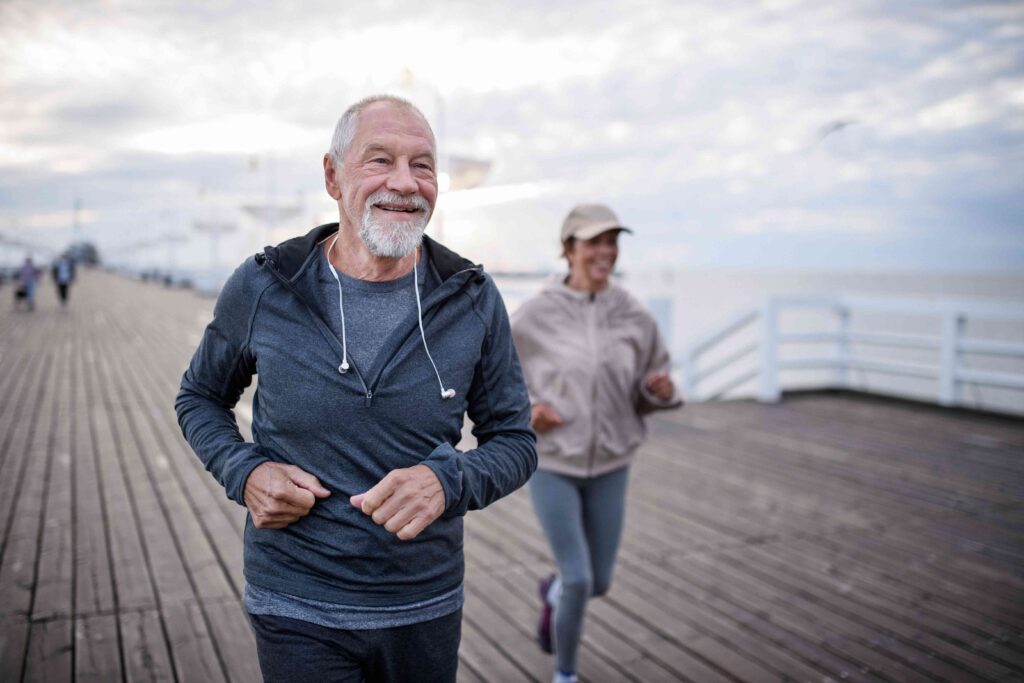:max_bytes(150000):strip_icc():format(jpeg)/Health-GettyImages-1365932225-388b0037ffdd4e30b307fc05c47824f4.jpg)
Want to boost your memory for tomorrow? Get in a workout today.
At least that’s the takeaway from a new study finding that older adults who did more moderate to vigorous physical activity than usual on a given day did better in memory tests the day after.
Researchers found that moving more throughout the day and getting at least six hours of sleep further enhanced mental performance.
The study, published Dec. 9 in the International Journal of Behavioral Nutrition and Physical Activity, builds on previous research showing exercise is good for brain health.
“We know from laboratory-based studies that we get a cognitive boost in the minutes to hours following a bout of exercise,” lead study author Mikaela Bloomberg, PhD, a senior research fellow in social epidemiology with the University College London’s Department of Epidemiology and Public Health, told Health. “We wanted to see whether this benefit might last longer than a couple hours outside of a laboratory.”
A Closer Look at the Study
To examine the link between exercise and memory, researchers recruited 76 cognitively healthy adults from the United Kingdom aged 50 to 83. The participants wore trackers on their wrists for eight days to monitor physical activity and sleep. They also took memory-focused tests daily.
Researchers found an association between an additional 30 minutes of moderate to vigorous physical activity, as measured by tracker data, and better short-term working memory and longer-term episodic memory, which is the ability to recall specific events the next day. Light exercise, such as taking the stairs or walking, did not affect memory the next day.
The association between cognitive performance and exercise held when researchers controlled for sleep scores. But they also found an independent link between more sleep and better episodic memory and psychomotor speed, a measure of how quickly a person can process information, make sense of it, and respond.
“Sleep contributes to cognitive performance and physical activity and sleep are intrinsically linked behaviors,” Bloomberg said. “Physical activity impacts sleep quality, both how much sleep you get and which sleep stages you spend the most time in, so we needed to look at both to get the whole picture.”
Experts agreed that the findings aren’t surprising. “There is increasing evidence that regular physical activity can enhance cognitive abilities and potentially lower the risk of developing future dementia,” Peter Gliebus, MD, director of cognitive and behavioral neurology at Marcus Neuroscience Institute, part of Baptist Health in Boca Raton, Florida, told Health. “This research reinforces existing evidence that regular physical activity is essential for optimal brain function.”
The study has several limitations, however, including the small sample size and the low diversity of participants’ cognitive health.
Why Moderate to Vigorous Exercise May Boost Memory
There are several reasons why moderate physical activity, and not lighter exercise, may provide a memory boost.
According to Yi Shan Lee, MD, a clinical assistant professor in the department of medicine at NYU Grossman School of Medicine, research suggests moderate to vigorous physical activity may increase the brain’s ability to create new cells and rewire itself, helping to strengthen memory.
These studies have involved brain imaging as well as measuring levels of memory-related neurotransmitters and lactate, a chemical typically elevated after exercise. Increased lactate levels “can further stimulate the production of these neurochemicals, likely causing the short-term effect discussed in this new research,” Lee told Health.
Bloomberg said moderate exercise can also reduce stress and anxiety, which can improve memory.
What Is Moderate to Vigorous Physical Activity?
The CDC defines moderate to vigorous physical activities as “working hard enough to breathe harder, raise your heart rate, and break a sweat.”
Lee says some examples of moderate exercise include brisk walking, walking on an incline, cycling, swimming, and dancing to upbeat music. Jogging, running, or playing sports like basketball or football rise to the level of vigorous activity, he added.
“The type of activities matters, as well as the duration of the activity,” Lee said. “There are many types of exercise, but a general reference point I tell my patients would be, ‘It would feel difficult to do the activity and keep up a conversation.’”













